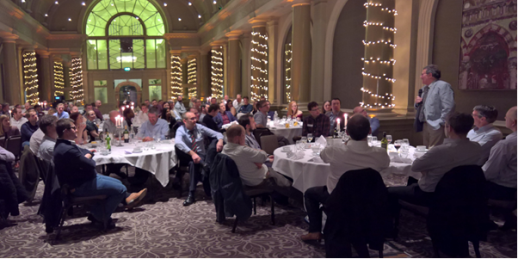 The Leeds Engineering Geology MSc course celebrates 50 years, writes Neal Gunn.
The Leeds Engineering Geology MSc course celebrates 50 years, writes Neal Gunn.
On Friday 13 January a celebratory dinner was held at the Metropolitan Hotel, Leeds (picture) to celebrate the 50th anniversary of the MSc Engineering Geology course at Leeds University. The Leeds Engineering Geology Society (LEGS) was set up as an informal alumni group, meeting every Friday 13th at the Eldon pub, across the road from the University. It was decided to mark this momentous occasion by a formal dinner to recognise the achievements of the course.
Over ninety guests attended, comprising alumni, staff and colleagues associated with the course. Guests came from across Britain (also Norway and Canada). Those present represented our industry partners, well-known and successful engineering consultancies, other academic institutes and government agencies including Atkins, CH2M Hill, Mott MacDonald, and Wardell Armstrong; Adivsan; Worley Parsons Group, Amey, Arup, Golder Associates, Jacobs, Sweco, WSP, Network Rail, and the British Geological Survey to mention but a few.
After dinner, recently retired Professor of Engineering Geology at Leeds, Steve Hencher (pictured) delivered a speech encouraging those assembled, particularly recent graduates, to challenge the assumptions of engineering geology in professional practice.
The initially part-time masters course in Engineering Geology at Leeds began in 1966 with full-time teaching from 1967 led by Alastair Lumsden (1974-2001). Alastair was succeeded by Dr Bill Murphy (2001-13), who continues to contribute to the course in the fields of rock and soil mechanics and hazards, sustainability & resilient infrastructure. Dr Jared West, a hydrogeologist, became programme leader in 2013 and also delivers teaching on hydrogeology and contaminant processes. Next year the role will pass to Dr Mark Thomas who returned to academia in 2009 following several years in industry, and currently delivers teaching on ground investigation and characterisation to the cohort, alongside research into hazards associated with volcanic processes.
The masters course, one of only three named postgraduate engineering geology courses in the UK, has continued to attract high numbers of students who benefit from the course’s applied nature and close industry links. These strong links with industry, including course scholarships, results in high application rates and a high calibre of student. Graduate employment rate of our graduates is over 90%.